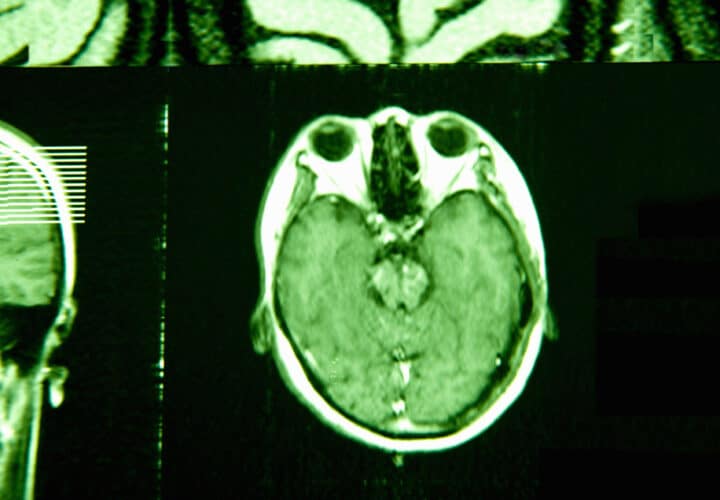A new AI-powered cognitive assessment claims it can detect Alzheimer’s within minutes; the UK’s National Health Service buys in.
Time is of the essence when it comes to Alzheimer’s — early diagnosis provides more time to intervene and slow its progress. Current technology is expensive and time-consuming, but a number of faster tests are in the pipeline. Some of those leverage artificial intelligence, looking for biomarkers in the blood, via brain scans, via eye exams — even through analyzing word usage on your smartphone.
The National Health Service (NHS) in the UK has put its stock in one of these new tests: the AI-based integrative cognitive assessment (ICA), an app designed to detect signs of cognitive impairment by yet another new means — pictures of animals.
The ICA is still awaiting approval from the Food and Drug Administration, but the approach is so promising, it has secured European regulatory approval as a medical device, and the NHS has already deployed it in both primary and specialist clinical care in the UK.
Designed by diagnostics company Cognetivity, the testing app relies on the brain’s ability to process information visually. In a period of five minutes, 100 images of natural landscapes flash onto the screen — 50 with animals in them, and 50 without. The test subject simply needs to tap the screen to classify the image as an animal or non-animal image.
According to Cognetivity’s Chief Medical Officer Dr. Chris Kalafatis, in a healthy brain, this process takes less than 200 milliseconds. In Alzheimer’s and mild cognitive impairment, speed and accuracy decline.
“Early diagnosis has been considered key in both delaying and its reducing the prevalence of the disease but also finding cures,” Kalafatis told Being Patient. “We found that the test engaged parts of the brain, the cortex, which are typically identified as among the earliest affected by Alzheimer’s disease.”
Study results recently published in Frontiers in Psychiatry indicate that the company’s test — the ICA — successfully detected mild cognitive impairment and Alzheimer’s dementia across two separate populations, reliably differentiating between healthy cognition, mild cognitive impairment, and Alzheimer’s at more than 80 percent accuracy.
Setting a Higher Bar for Diagnostic Accuracy and Sensitivity
These results are encouraging to Cognetivity not just overall, but in that, according to Kalafatis, their new test is successfully chipping away at three of the biggest obstacles faced by test developers in this fast-growing landscape of new tools and systems to diagnose Alzheimer’s.
First, Kalafatis said, there is the challenge of making the tests finely tuned enough to tell the difference between Alzheimer’s and different levels of mild cognitive impairment.
Then, there is the obstacle of, as he put it, tests being “bound by language and educational bias.”
A study previously found that for people who underwent three types of neuropsychiatric assessments as well as other diagnostic tests, some of these tests would falsely determine a person does not have dementia because test performance is linked to education or knowledge of a specific language.
Cognetivity’s test has done well in overcoming this hurdle so far, Kalafatis said. The ICA performed equally well in retaining its diagnostic accuracy across different populations, the only difference being the language describing the instructions.
“We actually validated the model in a demographically and culturally different cohort,” he noted.
When it comes to sensitivity, Kalafatis said, neurocognitive assessments like the Alzheimer’s Disease Assessment Scale-Cognitive aren’t sensitive enough to detect subtle changes in cognition.
The ICA on the other hand uses algorithms to detect subtle cognitive changes with 80 percent accuracy — a close match to the results of two other neurocognitive assessments already in use: the Montreal Cognitive Assessment and Addenbrooke’s Cognitive Examination. The ICA scores were also less correlated to education levels than within these two other assessments. Without losing accuracy, the test manages to be much faster, more sensitive, less biased, and easier to administer than other tests.
Kalafatis believes that the test will also allow clinicians and researchers to better track cognitive changes over time. If a person’s responses get slower after two months, it means that cognitive function is declining at a certain rate.
What Happens After Test Results Come In?
Lastly, the Cognetivity team saw an issue with what happens after the test is over — once the results are in.
In the current diagnostic landscape for Alzheimer’s — and especially, Kalafatis said, during the COVID-19 pandemic — there is no built-in way to ensure that medical care providers are following up with people after they are discharged from clinics back home.
Kalafatis explained that people can get lost in the system. “When they return, their dementia is generally quite significantly progressed,” he said.
Want to learn more about clinical trials
for Alzheimer’s and dementia?
Check out the Lilly Trial Guide.
By deploying the ICA, the physicians within the UK’s NHS hope to test people at regular intervals to track the progression of cognitive decline. Doctors will refer their patients to a specialist the moment signs of worsening cognitive function arises. Because the ICA is app-based, making it relatively inexpensive and light-weight to deploy, the agency hopes it will help many people track their cognitive functions as they age.
“We’re really excited by the ICA what it can do for our dementia assessment services,” Derek Tobin, associate director at Birmingham and Solihull Mental Health NHS Foundation Trust said in a news release. “We always strive to deliver better value and improved outcomes for our patients, and I am confident that Cognetivity’s technology will help us to do that in this area. I greatly look forward to seeing it at work in the hands of clinicians and patients.”
The best thing about an algorithm-based test, Kalafatis said, is that it improves itself over time: By adding more data about individual risk factors into the machine learning model, the accuracy of the ICA will be further improved.
Early diagnosis is the “holy grail” for Alzheimer’s, he added. In the future, he hopes, the ICA and similar diagnostic technology will allow physicians to diagnose Alzheimer’s 10 years earlier than they do today, leaving more time for treatment and hopefully improving quality of life for people living with Alzheimer’s and their loved ones.




How do I get involved in this testing? My dad died if ALZ and my wife currently has been diagnosed since Jan. 2019.